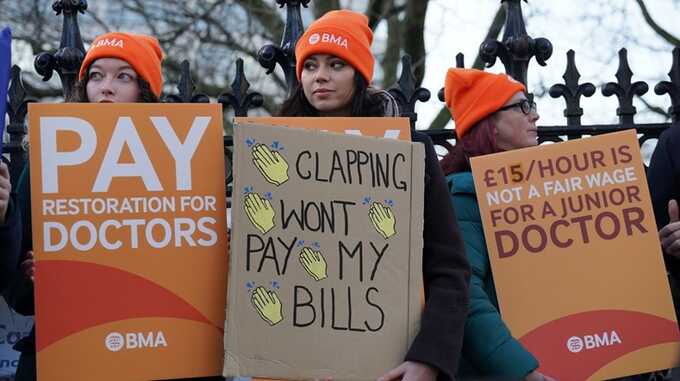Junior doctors in England to begin a five-day strike next month
The British Medical Association’s industrial action will take place from 27 June to 2 July - meaning it will clash with the ongoing general election campaign.
Junior doctors in England are set to strike for five days starting next month - part of a long-running dispute over pay.
The strike is set to run from 7am on 27 June to 2 July.
Talks had recently reopened with a view to ending the long-running disagreement over pay between medics in training and the government.
The British Medical Association (BMA) said it gave the government "a final opportunity to make an offer and avoid strikes" after the 4 July election was called, but "this opportunity has not been taken up".
Dr Robert Laurenson and Dr Vivek Trivedi, co-chairs of the British Medical Association’s junior doctors committee, said: "We made clear to the government that we would strike unless discussions ended in a credible pay offer.
"For more than 18 months we have been asking Rishi Sunak to put forward proposals to restore the pay junior doctors have lost over the past 15 years - equal to more than a quarter in real terms.
"When we entered mediation with government this month we did so under the impression that we had a functioning government that would soon be making an offer.
"Clearly no offer is now forthcoming. Junior doctors are fed up and out of patience."
Referring to the strike taking place during the election period, they said: "If during this campaign he makes such a public commitment that is acceptable to the BMA’s junior doctors committee, then no strikes need go ahead."
’Highly cynical’
Health secretary Victoria Atkins branded the decision to strike during the election "highly cynical", and called on Labour to "condemn" the action.
"Today should be the day the Labour Party finally condemn junior doctor strikes," she posted on X.
"Announcing this during an election and on Labour’s health day shows this was only ever political and not about patients or staff."
She added: "This Conservative government has taken the tough decisions to keep public spending down to bear down on inflation, which is now back to normal.
"Labour would be in the hands of their union paymasters - meaning more spending and higher taxes."
Labour’s shadow health secretary Wes Streeting said his party would also not meet the 35% pay demand of junior doctors "because we can’t afford it".
"I’d rather be honest about that now then make false promises and let people down after the election," he said.
"What I am absolutely willing to do is to sit down and negotiate. If this is not settled, negotiate immediately.
"When we get into government after the general election to negotiate with the junior doctors on pay and on the wider conditions that they’re suffering under, because whether it’s rotations, placements, I’ve been horrified by the way the NHS is treating junior doctors on this government’s watch."
Offer rejected
The government gave junior doctors in England an 8.8% pay rise last summer, with an extra 3% offered during the last round of negotiations towards the end of the year.
The BMA has rejected the 3% offer because it did not make up for a real-term pay cut of nearly a quarter for junior doctors since 2008.
Instead, the BMA is calling for full pay "restoration" to reverse real-term cuts in pay since 2008-09 alongside a new pay mechanism to prevent any future pay decreases against inflation and the cost of living.
The union also said it wanted a reformed Doctors’ and Dentists’ Review Body for independent and fair-pay recommendations for staff to "safeguard recruitment and retention of junior doctors".
Read more similar news:
Comments:
comments powered by Disqus


































